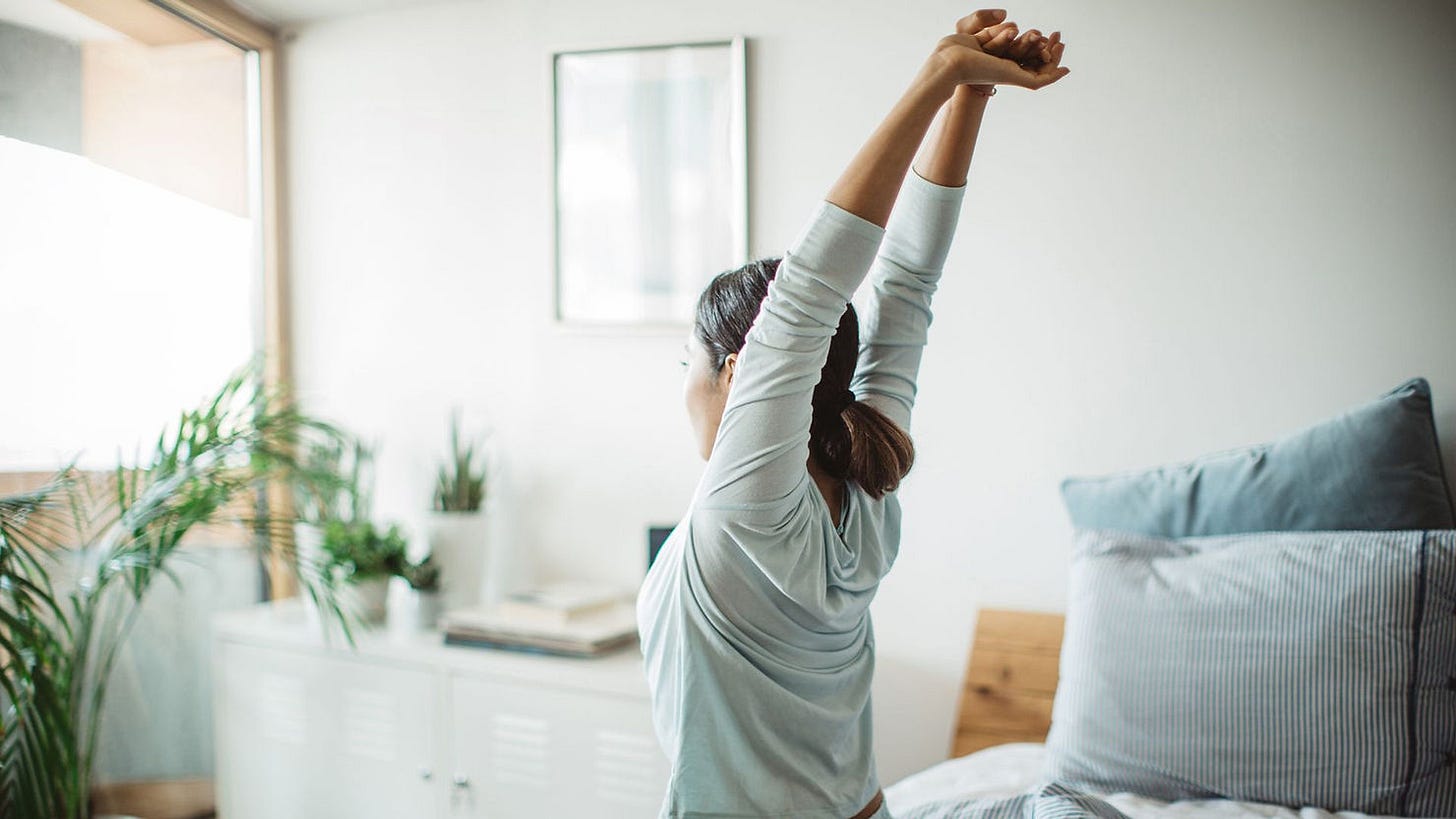How do you wake up in the morning?
Life for me has been significantly different ever since I designed my morning routine as a key part of my daily mindfulness practice.
I find that waking up mindfully helps me in beginning every day with more alertness and calmness, getting through each day's challenges with greater clarity and resilience, and feeling less exhausted or depleted at the end of the day.
Following a routine with more intention and awareness has also strengthened my self-discipline, which plays an important role in how effectively I navigate my life.
This is how I typically wake up every morning:
1. I remind myself not to jump out of bed right away.
I turn off the alarm and rest in stillness for a couple of minutes to check in with how the body is feeling. I tune in to the body breathing in and out, and any physical sensations that are standing out in each moment. This helps me shift out of sleepiness and make sense of my immediate experience. On days when I feel more tired than usual, I sit up on the bed to ensure I don't slip back into dreamland.
2. I ease into wakefulness, one activity at a time.
Upon getting out of bed, I hydrate my body by drinking some warm water, make my bed, brush my teeth, and wash my face to invite more alertness. I set the intention to approach each of these activities more mindfully, by doing one thing at a time instead of multi-tasking, and paying attention to my five senses as a way to stay present with my experience.
3. I practice some stillness.
Learning to be still is crucial in mindful living. I carve out time to sit and engage in my go-to practice - mindful breathing, the body scan, and some loving-kindness. I often use an app to time my practice with reminder bells and track my daily meditation habits.
4. I practice some movements.
I usually do a simple yoga routine, or engage in some gentle stretching movements to further wake up the body, release tension, and work with any physical discomfort that comes up. This requires me to pay extra attention to my body's needs and take care not to over-strive during the practice.
5. I take care of my body and appearance when I shower and get dressed.
I remind myself that these two daily routine activities are not just another "to-do" on my list, but a form of self-care. I practice being more aware of how I am grooming myself and keeping my body clean, and what clothes I choose to wear for the day. During these activities I ground my attention to the physical sensations of my body as it is moving, rather than allow myself to get lost in the autopilot mode or the headspace of non-stop thinking.
6. I have a "better breakfast".
As I consider breakfast to be the most important meal of the day, I make it better by being more aware of what and how I am eating. I remind myself of the foods that are better for my health and consider if I should limit my caffeine or sugar consumption for the day. I put my phone aside so that I can pay full attention to the eating experience, and note if I'm eating too quickly and not chewing my food thoroughly enough.
7. I attend to my physical space before heading out.
Before I head out, I take a minute to see if I am leaving my physical space in a state that I would like to come back home to. This includes keeping it tidy (e.g. throwing any worn clothes in the laundry, placing items back where they were intended to be), and ensuring that all lights and power points are switched off for energy conservation.
8. Finally, I mindfully transition to work.
When I am commuting, I limit the use of my phone to consuming nourishing content, such as listening to podcasts or reading an article. When I am walking, I take safety into consideration and make sure I don't use my phone at the same time. Before I switch on my laptop or starting my first meeting of the day, I take a few deep breaths to calm the mind and body before shifting into full-on work mode.
---
We can now see that mindfulness practice doesn't have to be a time-consuming endeavour, and when it comes to integrating mindful moments into your day-to-day life,
a little goes a long way
consistency is key
it's okay to exercise some flexibility
Some of us may have a rather unpredictable schedule and find it hard to stick to a regular routine. In my case, I adjust the time I wake up according to when I need to leave home or start work, and if there really is no time to fully practice my usual mindful morning routine, I prioritize what is most essential for me.
For example, if I don't have time for a 45-minute sitting meditation and a 20 minute yoga practice, I may just sit and forgo the yoga practice, or I might sit for a shorter duration.
Our practice might also get interrupted by the people living with us, and so it is important for us to first communicate our intention to practice waking up mindfully, seek their support, and establish some boundaries within the household.
My family knows that I practice sitting meditation in the morning, and so they remind themselves not to knock on my door unless absolutely necessary, and they exercise thoughtfulness by lowering their volume as they go about their own morning routines.
Sometimes, the biggest problem we can face is that we forget to wake up mindfully, because we are so used to a certain way of life. This is when niàn - the practice of reminding ourselves to live better - becomes so important in supporting our own wellbeing.
------



